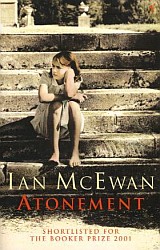 |
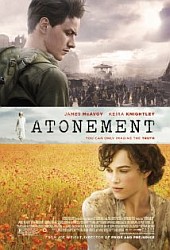 |
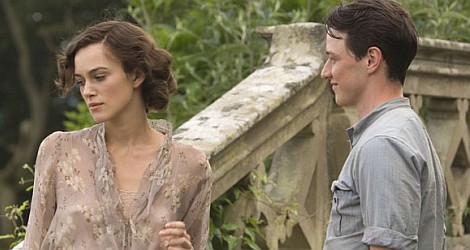 |
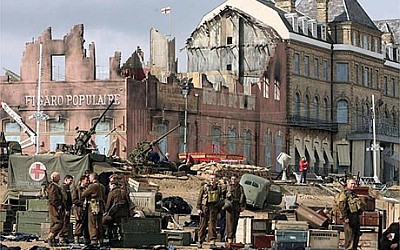 |
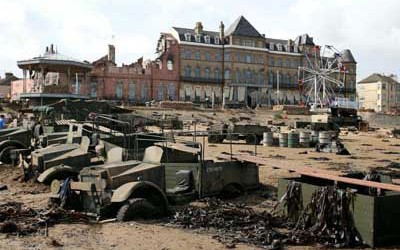 |
Atonement
Reviewed by
Martyn Palmer
The Times, September 1, 2007
Edited by Andy Ross
It's all rather surreal for Ian McEwan. The seafront of Redcar in North
Yorkshire has been transformed into Dunkirk, 1940, and the words McEwan
wrote in the privacy of his study are being played out before his eyes in
the film version of Atonement.
Today's shot, a sequence capturing the
chaotic nightmare of the beach as soldiers wait to be evacuated, will form
the centrepiece of the film, and if the buzz is to be believed, people will
still be talking about it come Oscar time next year. Atonement is the best
British film for a long, long time.
Director Joe Wright, a
35-year-old Londoner, has reassembled the creative team who made Pride and
Prejudice with him, to take on Atonement, a complex novel that many thought
unfilmable.
McEwan himself takes an executive producer credit and has
been happy to give input when asked, but wasn't interested in writing the
script. "I think when you sign the rights over, you've got to let whoever
wants to make the movie do it in their own way."
Atonement, mostly
set in two time periods, 1935 and 1940, is an epic tale of the tragic
consequences of a lie told by a young girl and the havoc this visits upon so
many lives as they are caught up in momentous events. The first part of the
story is set in a country house on a summer's day and crackles with sexual
tension between Robbie Turner (James McAvoy) and the upper-crust daughter
(Keira Knightley).
McEwan drew inspiration from the stories told to
him by his late father, David McEwan, then a corporal in the Highland Light
Infantry. "He did talk about those experiences in the year or two before he
died," says McEwan.
As the sun begins to dim, Wright and his team are
finally ready for the shot. The cameraman does a take, and at the end his
colleagues are waiting to take the steadicam from him while he catches his
breath. Wright asks to do a second take and then a third.
"He was
brilliant," says McEwan. It sums up McEwan's feeling about the whole
production.
Reviewed by
Peter Kemp
The Sunday Times, September 16, 2001
Edited by Andy Ross
Atonement opens with a leisurely expansiveness unexpected from Ian McEwan.
It is the hottest day of the hot summer of 1935, and
13-year-old Briony
Tallis, feverish with literary ambition, has just written a play for family
performance. As she tinkers with this juvenile production, the cast for a
grimmer drama assemble around her. Prominent among them are her precocious
cousin Lola, her brother and his guest, her older sister and Robbie Turner.
McEwan here opts for a slow, suffocating build-up of tension. As always,
he is engrossed not merely by damage but its aftermath. Moving ahead to
1940, he accompanies Robbie across northern France to the Dunkirk beaches,
then jumps back over the Channel to watch Briony, guilt-ridden at her role
in earlier events, training as a nurse in London in the eerie lull before
the Blitz.
Both sections are immeasurably the most powerful that
McEwan, already a master of narrative suspense and horror, has ever written.
As Robbie limps past surreal tableaux of defeat, he is rocked by near-miss
bomb blasts and strafed by machine-gun fire from Stukas. The hospital-ward
sequences uncover hideous injuries with unflinching, delicate precision.
Atonement is a richly intricate book. Although his novel graphically
depicts the horrors of war, it is the dangers of the literary imagination
that it looks at most persistingly. Throughout 60 years as a writer, Briony
seeks to rectify a "crime" she perpetrated in 1935 because of the impulsions
that later made her a distinguished novelist. There's no doubt about
McEwan's superb achievement in this book.
Reviewed by
Robert MacFarlane
The Times Literary Supplement, September 28, 2001
Edited by Andy Ross
The novel is divided into three parts. The first section, which spans only
twenty-four hours of narrative time, takes place during the torpid summer of
1935. The central section cuts between France and London during the days of
the Dunkirk retreat in 1940, and includes some superb re-creations of
wartime. Latter-day London is the setting for the short final section.
The novel opens on the hottest day of 1935, in the Surrey country house
of the Tallises, an upper-middle-class Home Counties family. Supine in the
master bedroom is Mrs Tallis, a neurasthenic matriarch disabled by migraine.
Cecilia, the eldest daughter, is pondering her future. Her thirteen-year-old
sister, Briony, is hard at work writing a play. Full of belief in her own
talent as a writer, but unsure of how others regard her, Briony is
dangerously obsessed with becoming both a novelist and an adult. Robbie, a
friend of the family and Cecilia's peer, is just back from Cambridge.
McEwan has often been praised for the menace of his writing; for his
ability to instil an unease in the reader which is simultaneously
discomfiting and mesmeric. This is powerfully the case in the opening part
of Atonement. The claustrophobic solstice heat, and the brittle interactions
of the characters, are eloquent of disaster.
A single event triggers
a disastrous chain reaction, and that the chief cause of that disaster is
Briony. "Briony's crime", as it becomes known, consists of an error of
judgment. In the garden of the house, at night, she witnesses an event which
is itself awful. Convinced that she has understood what occurred, she acts
on that conviction with appalling consequences.
Briony believes that
she ought to have not a gradated growing up, but a single turning point of
immense significance. Briony decides that she must have an "unforgettable"
peripateia. She wrongly distils a morality from a sequence of actions, and
makes a mistake for which she spends the rest of her life atoning.
The themes of Atonement — time and loss, connection and separation,
innocence and experience — will be familiar to McEwan's readers, and so too
will some of the book's effects. Stylistically, too, Atonement is
unmistakable McEwan. It is written in his typical sentences: short and
unshowy, but supple, demonstrating a willingness to let ordinary language do
the talking.
Probably the most impressive aspect to Atonement is the
precision with which it examines its own novelistic mechanisms. McEwan
focuses on the way in which we create the future by making it fit templates
of the past; how the forms into which the imagination is shaped by fiction
are applied to life. Briony is McEwan's test-case for this enormously
serious theme. The dust jacket proclaims Atonement his "finest achievement",
and in this case they are triumphantly right.
Ian McEwan
Q&A with Isaac Chotiner
The New Republic, January 11, 2008
Edited by Andy Ross
Was it hard to watch Atonement be adapted to film?
I'm fairly used to the process. I think this is the fifth or sixth of my
stories or novels that have been made into films. I'm sure I'd be possessive
if I allowed myself to get involved in the writing of the script. But I
can't quite walk away, so I like to stay involved. I like film sets, and I
enjoy the collaborative process.
Were you worried that film
is a medium in which it is harder to get inside a character's head?
Well, it is impossible for a movie to give you what a novel can give
you. But you have to do the best with what you've got, which with movies is
a high dependence on actors to somehow let us feel the illusion that we can
follow a thought process.
Earlier in your career, you were
known as "Ian Macabre"
One passes the usual milestones
in life: You have children, you find that whether you like it or not, you
have a huge investment in the human project somehow succeeding. And when you
get older you feel maybe a little more delicate and hope that things will
flourish. You don't want to take a stick to it.
On what is real in fiction
The kind of fiction I like and the kind of fiction I most often want to
write does have its feet on the ground of realism, certainly psychological
realism. I have no interest in magical realism and the supernatural--that is
really an extension, I guess, of my atheism.
Favorite
writers
Bellow, Roth, and
Updike. They have been voices all the way through my writing life, from the
time I started writing. I read Portnoy's Complaint, Rabbit Run, and Mr.
Sammler, and there was nothing like that happening in Britain or for that
matter in Europe, so far as I could tell. It has something to do with a
largeness of ambition, a generosity of imagination, and a wicked sense of
humor. I have kept faith with those guys.
On the New Atheists
I am a little baffled as to
why it is called the "New Atheism." There is a very long tradition of free
thinking, and the arguments made against religion tend to be the same but
made over and over again. But I think what has happened is that there have
been a number of good, articulate books — Hitchens, Dawkins, Dennett, Sam
Harris, and so on.
On religion
I think it is ineradicable, and I think it
is a terrible idea to suppress it, too. We have tried that and it joins the
list of political oppression. It seems to be fairly deeply stitched into
human nature. It seems to be part of all cultures, so I don't expect it to
vanish. And yet at the same time, if it is built into human nature, why are
there so many people who don't believe in it?
AR (2008) Loved the book, gotta see the movie.
(2012) Seen the movie many times. Love it.
